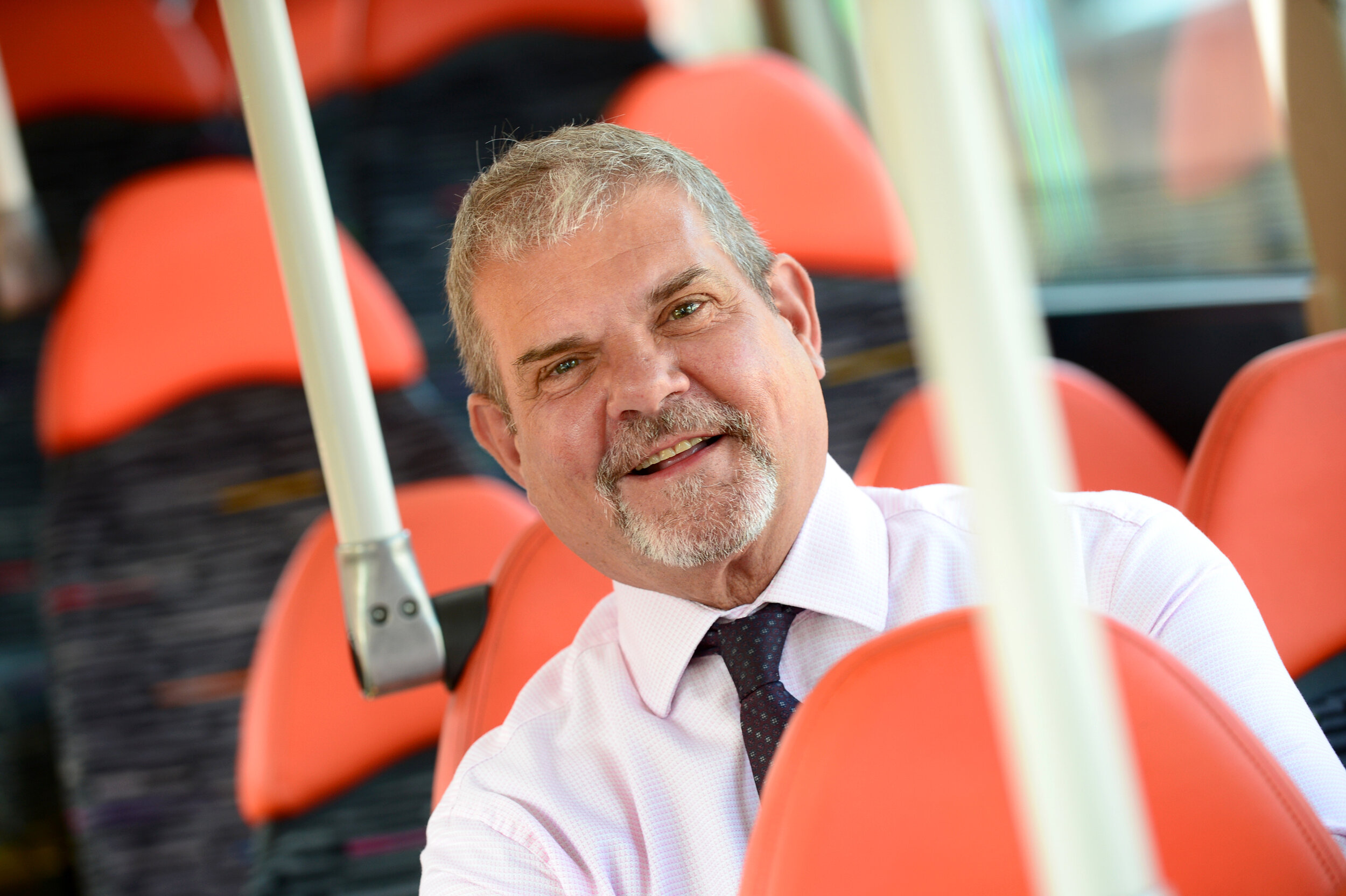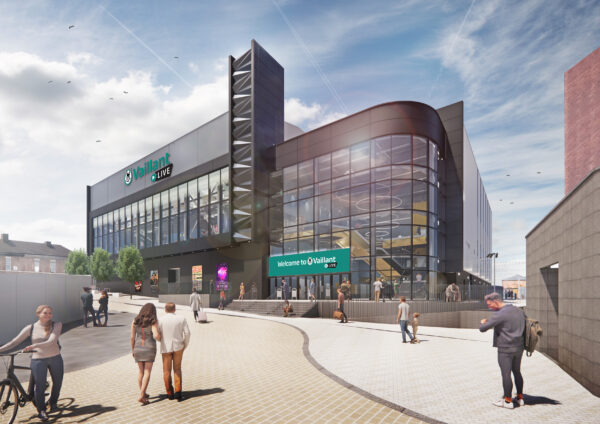Latest News | 19 November 2020
Keeping Derby on the move through lockdown

Among the key workers praised during the coronavirus pandemic, the bus driver stands alongside the supermarket staff, the delivery driver and many others who we could simply not have managed without. Health workers were rightly applauded as the heroes, saving lives while risking their own. But for so many Derbyshire people, the bus has been and remains a lifeline.
Here, trentbarton managing director, Jeff Counsell, tells us what it has been like at one of the sharp ends of the crisis.
March 2020 feels like it was a lifetime ago. Back then, trentbarton was looking ahead to an exciting year, with major investments in brand new buses and breakthrough technologies.
Yes, the issue of congestion was as frustrating as ever. Clogged roads equal disrupted journeys, timetabling pressures and, most importantly, poorer air quality for us all.
But there were many good things happening too. Our depots and their staff were planning months of fundraising for their freshly chosen charity of 2020, the Teenage Cancer Trust. We had launched our ‘trentbarton together’ community fund to support local good causes.
At the turn of the year the milestone of an astonishing one million bus journeys had been planned on our ‘hugo’ app for mobile phones and other mobile devices.
Our Derbyshire drivers were the reigning holders of the title of the UK’s best in a national survey of almost 50,000 people by Transport Focus, which also found Derbyshire has the most satisfied bus customers in the UK.
Everything was in place for our annual ‘really good service awards’ ceremony for our wonderful staff. The glitzy celebration was to be at Derby’s Roundhouse on 9 April.
And then came 23 March… and, as you know, everything changed for so many people and so many businesses. Although, for trentbarton, not quite everything.
Many of our customers are key workers. They work in shops, in hospitals, in care, in manufacturing. They are police officers, nurses, shop assistants, carers, caterers. They make, they serve, they feed, they help, they support.
And they still needed our help and support to get to work and to get home again.
We faced the enormous challenge of maintaining our services amid so many unknowns.
How many people would still travel, and how many with us? Where were they going and when? How many of our drivers and support teams would be affected?
The first thing we did was to help older and vulnerable people get to the shops and banks during their new dedicated early morning opening hours, by accepting concessionary bus passes in the morning peak.
As everyone will remember, the roads were eerily quiet in those first lockdown weeks, with schools largely closed and ‘WFH’ (working from home) becoming a familiar acronym.
The message was only to use public transport if you had no alternative. Our passenger numbers plummeted.
But those passengers still travelling with us really needed us there so they could fulfil their vital roles in keeping our society fed, warm and cared for. We couldn’t simply stop. And we didn’t want to.
But our costs were not in lockdown. Our buses and their drivers couldn’t ‘WFH’.
So, we had to adjust our timetables and revisit our frequencies, all while still providing a meaningful and useful service.
Bus drivers in London had started falling ill in disproportionate numbers. That was a scary time for all involved.
We sought out all the advice, from the Government, the WHO, from our industry. We made our buses Covid-secure. We’d only recently introduced contactless tap-on, tap-off payments, which was a big help.
By June we were increasing service levels again, as lockdown one was easing.
Public transport got the green light, from a health perspective. But still numbers were depressed.
Society had shifted its behaviours and would not be going back, but onwards to a ‘new normal’.
As I write this, ‘lockdown two’ is under way. And we await its impact, epidemiologically, of course, but also on travel patterns and densities.
I must pause here to pay the most heartfelt thanks to every one of my colleagues.
The drivers, the mechanics, the cleaners, the managers, those who communicate with our customers and every other single member of our team.
I have never been prouder to be part of trentbarton. When our red arrow driver Karen Miles received a Covid BEM (British Empire Medal) award in the Queen’s Birthday Honours, she was the first to dedicate it to all her colleagues.
Karen epitomises all that is great about our teams, who have diligently served their communities throughout the coronavirus pandemic.
We should – must – look forward now. Beyond the day-to-day, week-to-week meeting of the challenges of providing a comprehensive bus network, however much time and energy that absorbs during lockdown two and beyond.
The return of congestion during the summer and into the autumn reminds us all that we share a common problem.
The people of Derby and the towns of Derbyshire will, post-COVID, remain afflicted by too many vehicles on our roads and the consequent impact on the air we all breathe.
Our elderly, our children, our fellow citizens with underlying health conditions plus the currently healthy all deserve cleaner air.
We have continued to invest substantial sums in newer, cleaner buses (one new diesel bus is less polluting that one new diesel car).
We want to move towards zero-emission buses. But we can only afford to if passenger numbers first recover and then exceed pre-COVID levels.
And that will only happen if our services are attractive, reliable, punctual, productive and convenient for customers. And if buses receive effective priority measures such as smart signalling, segregated lanes and disincentives for the private car.
Then more people will get out of their cars and onto a bus, reducing congestion and enabling the bus services to have all of the above attributes, more and more.
That virtuous circle will provide the positive feedback loop required to make journeys faster and the air cleaner.
We are engaged with the Government through our trade body, The Confederation of Passenger Transport, regarding its continued support for our industry and are working and liaising with the city council on these issues, as we together seek to decarbonise Derby.
And we continue to invest in innovation in other aspects of public transport.
Our new mango app for smartphones launched in the summer – it was a world first for a bus company, right here in Derbyshire.
Users of the scan-on, scan-off app now greatly outnumber customers using the old mango card or cash.
The app opens up an exciting future of enhancements so we can make travelling with trentbarton ever more convenient, connected and productive.
And that will be more than just the ticket.
Jeff Counsell joined trentbarton in 1999 as director of engineering. In 2003 he became director of service delivery and was promoted to managing director in 2009. Before trentbarton he was engineering director for Arriva in the north east of England. He graduated with an MBA from the University of Central Lancashire in 1994. He is a Fellow of the Chartered Institute of Logistics and Transport.



